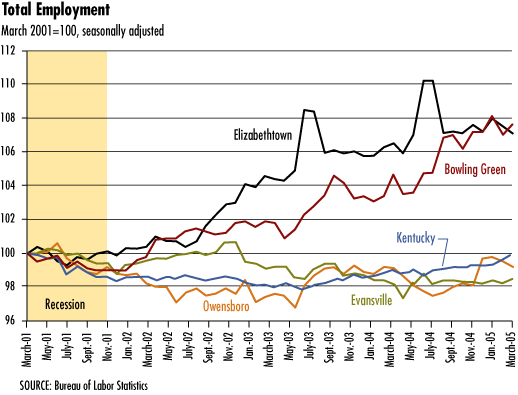District Overview: Health-Care Industry Pulls Memphis Out of Job Slump
During the 2001 recession, payroll employment in the Memphis metropolitan area declined as it did in other parts of the country.1 While some sectors were deeply affected (namely, manufacturing and professional and business services), others suffered little if at all. A case in point is the leisure and hospitality sector, which declined only slightly during the recession and has since expanded considerably. The education and health services sector took center stage by adding jobs during the recession and continuing on a strong expansionary path after its conclusion.
Total nonfarm payroll employment in Memphis had been growing steadily prior to March 2001, the official date for the onset of the national recession. Employment grew by 12.4 percent between January 1995 and March 2001. Between March 2001 and November 2001, the official end of the recession, Memphis lost 8,700 jobs, or about 1.4 percent. Just as in the rest of the country, employment continued to decline after the recession was officially over, but by June 2002, Memphis employment was on its way to recovery. As of April 2005, Memphis employment exceeded its prerecession level by about 2,100 jobs.

Highlights and Lowlights
The brightest spot in the Memphis economy, both during and since the recession, has been the education and health services sector. From March 2001 to April 2005, employment in this sector grew by 13.3 percent. The driving force has been the health services component, which contributed 10.8 percentage points to this increase. Moreover, the expansion in the health sector represents about 59 percent of the net increase of 10,800 nonfarm jobs in Memphis since November 2001.
Manufacturing and professional and business services were the two sectors hit the hardest during the recession. Manufacturing represents approximately 10 percent of total nonfarm employment, and the professional and business services sector represents about 11 percent.
During the recession, manufacturing employment in the Memphis area fell by 4.7 percent and continued to decline long after the national recession was over: Between March 2001 and April 2005, employment in this sector fell by a total of 10 percent. At the national level, manufacturing employment fell by 15.5 percent over the same period.
Professional and business services did not fare much better. Although it was the fastest-growing sector in Memphis between January 1995 and March 2001, employment in this sector fell by 3.6 percent during the recession. It continued to drop afterward. Memphis' experience contrasted with that of the rest of the nation. In the United States as a whole, professional and business services employment has increased since the end of the recession.
Trade, transportation and utilities is the leading sector in the Memphis economy, corresponding to about 28 percent of total nonfarm employment. This sector also hit a bump during the 2001 recession: The sector lost 3,800 jobs, a decline of 2.2 percent. Of those jobs, only 41 percent had been recovered by April 2005.
The leisure and hospitality sector, which represents about 10 percent of total nonfarm employment, was also adversely affected by the recession, declining by about 1 percent. The number of jobs in this sector, however, increased by 7.5 percent from November 2001 to April 2005, which in part owes to the thriving casino and hotel industry, particularly in Tunica County, Miss.
Conclusion
Overall, the Memphis area labor market has managed to weather the 2001 recession reasonably well despite the losses suffered by the transportation, manufacturing, and professional and business services sectors. Credit goes to the remarkable performance of the health-care industry, which continues to create jobs, and to the steady growth experienced by the leisure and hospitality sector since the end of the recession.
Endnotes
- The Memphis metropolitan area consists of Shelby County, Tenn., where the city of Memphis is located, as well as seven additional counties: Tipton and Fayette counties in Tennessee; DeSoto, Marshall, Tate and Tunica counties in northwestern Mississippi; and Crittenden County in eastern Arkansas. [back to text]
Views expressed in Regional Economist are not necessarily those of the St. Louis Fed or Federal Reserve System.
For the latest insights from our economists and other St. Louis Fed experts, visit On the Economy and subscribe.
Email Us

